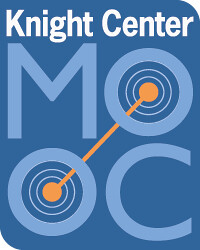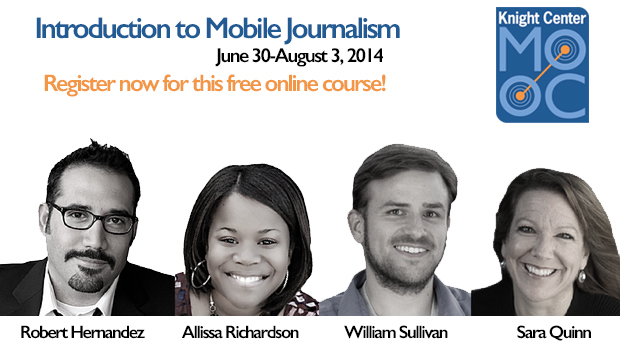

Mobile devices are everywhere. They have become a global phenomenon in all facets of life – including journalism. News organizations in today’s digital media landscape can no longer think Digital First – but Mobile First.
To help people interested in learning about the latest in the mobile media landscape and how journalism can be done via the mobile the Knight Center for Journalism in the Americas will offer the free Massive Open Online Course (or MOOC) “Introduction to Mobile Journalism.”
“The Introduction to Mobile Journalism MOOC is going to catapult students into the 21st century and get them up to speed on every layer of how mobile is affecting journalism including the latest best practices in mobile reporting, design, product development, audience research, trends and future mobile/wearable tech,” Will Sullivan, director of Mobile for Broadcasting Board of Governors and one of the instructors in this special course said.
The course will take place from June 30-August 3, 2014. Click here to register. The five-week course in English will be the Knight Center’s 11th MOOC since launching its massive courses program in October 2012. More than 40,000 people from more than 160 countries have participated in the Knight Center’s MOOCs.
Just like all of the previous MOOCs, the course is mainly directed toward journalists but will be open to anyone in the world with an internet connection. Mobile designers, developers, programmers, news editors and publishers as well as anyone interested in mobile may find this course of interest. No prior experience with the concepts or tools is required.
“The mobile revolution is affecting newsrooms all over the world and many of the students of previous courses we offered suggested that we should offer a training program in this topic. So, we are delighted to offer this MOOC and we are grateful to the experts who will teach during five weeks in our unique program of massive courses in journalism,” said professor Rosental Calmon Alves, founder and director of the Knight Center at the University of Texas at Austin.
“Introduction to Mobile Journalism” will follow the popular multiple-instructor format pioneered by the Knight Center’s MOOC program. Each week of the course will be taught by a different instructor, each one a leading authority in the field of investigative journalism. The instructors and the topics they will cover are:

This introductory course will teach students about how the global adoption of mobile has influenced and changed journalism, how to report and engage with audiences using mobile devices, how usability and product design principles can inform and help build effective mobile experiences, how to make informed decisions about mobile news product development, and how to plan for the future of mobile.
“I’m excited about how this course came together, bringing smart people who are passionate about mobile and sharing their knowledge,” Robert Hernandez, professor at USC and one of the instructors in the course said. “While we cover a lot of mobile-related topics, I think this course gives you a solid grounding on how to work within our current ‘mobile first’ world, which is a global reality. It also has fun, forward-thinking concepts like wearables and augmented reality.”
The course will include videos, tutorials, reading materials, exercises and quizzes. Just like the Knight Center’s other MOOCs, the course will be divided in weekly modules and will be completely asynchronous, meaning there will be no live lectures. Even though students can take the course at the times of their choosing, each weekly module will have deadlines for submitting the quizzes and participating in the forums.
Anyone from anywhere in the world can register in our MOOC system and enroll in the course. Enrollees will have immediate access to the syllabus, an introductory reading, and a video from the instructor explaining how the MOOC will work.
Although the course will be free, if participants need to receive a certificate, there will be a $30 administrative fee, paid online via credit card, for those who meet the requirements. The certificate will be issued only to students who actively participated in the course and who complied with most of the course requirements, such as quizzes and exercises. The certificates will be downloaded as a PDF document. No formal course credit of any kind is associated with the certificate.
A MOOC is a new type of online learning program that was designed to reach a large number of students.
The Knight Center became a pioneer in massive journalism online education when it launched its MOOC program in journalism in October 2012. Since then, the Knight Center has offered ten courses and reached more than 40,000 people from more than 160 countries. Unlike most MOOCs, the Knight Center’s massive courses are created specifically for this program and seek to encourage the largest amount of student-to-student and instructor-to-students interactions as possible.
The Knight Center for Journalism in the Americas was created in 2002 by Professor Rosental Alves, who holds the Knight Chair in Journalism and the UNESCO Chair in Communication at the University of Texas at Austin School of Journalism. The center is based at the Moody College of Communication at UT Austin. Launched with major, multi-year grants from the John S. and James L. Knight Foundation, the Center also has received grants from Open Society Foundations and other donors. The Knight Center also has been sustained with support from the University of Texas at Austin’s Moody College of Communication, modest foundation grants and the public.

Knight Center for Journalism in the Americas
300 West Dean Keeton
Room 3.212
Austin, TX, 78712
Phone: 512-471-1391
Email: journalismcourses@austin.utexas.edu